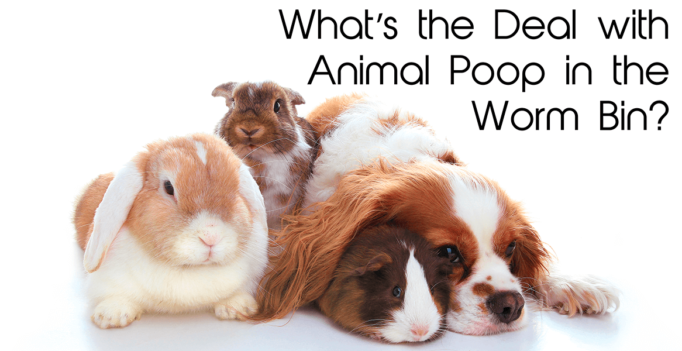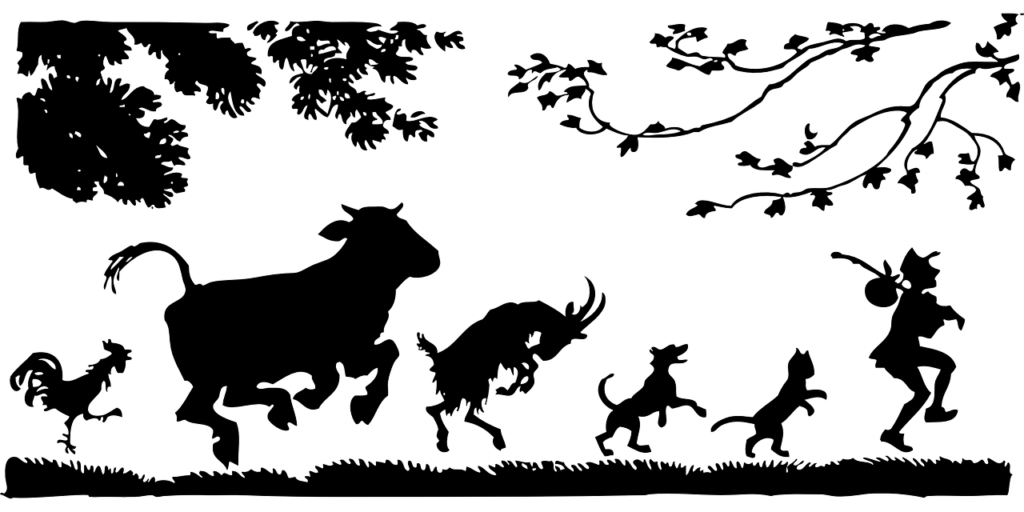When you raise compost worms, dealing with poop is just part of the job description. And, when you raise larger animals, dealing with LARGER poop comes without question. Now, you can combine the two and let your red wigglers do the dealing for you!
Using compost worms is nothing if not a resourceful way to handle food scraps, yard waste, and even excrement from many types of animals. Today you’ll learn which of those animal waste products are useful in the worm bin and which to avoid.
Poop with a Purpose
Cleaning up after household pets or farmyard animals is generally not an owner’s favorite task, but when that poop is transformed into black gold, the job becomes a little bit sweeter. So what makes some animal waste worthy of a second go around? In the worm bin, it’s actually pretty simple.
Worms maintain a primarily plant (and microbes) based diet. When they aren’t eating fruits and vegetables, they easily consume moist paper products made from a range of processed green materials.
Interestingly, the solid waste of most herbivores in many ways offers the same nutrient blend that our worms digest and transform so efficiently. Whether it be grass, grain, or other vegetable matter, an animal only partially digests the fibrous matter that passes through its body. Passed on to a compost worm, the now worm food is already fairly broken down, well mixed, and easy to consume.
Is it the Perfect Poop Recipe or Poison?
The piles of manure so abundant on a farm have long been the rural gardeners’ go to for fertilizer. Indeed, there is much value in a cow pie/horse patty. But why?
All dung has a balance of nutrients specific to the diet and digestive process of the individual animal. In different amounts, solid waste contains the beneficial nutrients of nitrogen, phosphorus, and potassium. The only drawbacks are that fresh waste also has high levels of ammonia and pathogens we would never want to add to the worm bin.
Fairly simple methods of hot composting will take care of toxic ammonia and pathogens, but be wary of waste contaminated by pesticides, urine, and questionable feed sources. These are best kept out of the worm bin for the health of your worm herd.
How to Create Food from Manure
If all the raw materials a worm needs come in a neat little poop package (or large poop package, as the case may be) then the hardest work is done by the time that pile hits the dirt. Good for us! But there’s just a little more to be done.
Remember I mentioned those pathogens and that harsh ammonia? Those can be toxic to both the worms and potentially to humans. Not only that, but the nutrient breakdown of some animals’ waste is so high in nitrogen that if it were thrown right into the worm bin it could potentially heat up so much during decomposition that it would drive the worms away or simply kill them.
The solution is really simple. All we need to do is to let that poop sit out a while or raise in temperature enough to kill the harmful bacteria.
Though there is no set standard for how long horse manure must age, you can tell when it is finished once any manure smell is undetectable and what you have looks like soil. Generally, this takes 2 to 3 months depending on conditions.
To offset any imbalance in nitrogen content, mix in plenty of carbon-based bedding when you are feeding manure to your worms. Keep the mixture at about 80% moisture and watch that the temperature doesn’t start to rise from further decomposition.
If you aren’t sure how to measure moisture or bedding temperature accurately, check out the simple probe meters The Squirm Firm offers to keep track with a quick and easy reading.
Animals with Worm-Safe Poop
As we’ve seen, some animal waste is better than others, and some should just be avoided.
 If you were wondering, when it comes to human waste, there are some composting toilets that make great use of red wigglers to do the dirty work of breaking down what is, er, deposited. However, that is NOT to say human waste should go into a worm bin. It should not. Sorry, not even from the bum of a vegetarian.
If you were wondering, when it comes to human waste, there are some composting toilets that make great use of red wigglers to do the dirty work of breaking down what is, er, deposited. However, that is NOT to say human waste should go into a worm bin. It should not. Sorry, not even from the bum of a vegetarian.
Though this list is not exhaustive, it includes the most common sources of manure you can easily process into nutrient-rich worm food. If you don’t see your pet or farm animal here, just ask yourself, is this animal an herbivore? If so, chances are the poop can be safe to use.
Click any one of the animals listed below to see more specific information about their waste and its use in the worm bin.
In Conclusion
If poop is a raw material that you have an abundance of, I highly recommend it as part of the blend of browns and greens you feed your red wigglers. If you are using what you harvest from your worms as a commercial product, keep in mind that it could take up to 3 months for your compost worms to process through a single level of the Worm Factory 360. If you are using it only for your own garden, and harvest even more regularly, be advised that not all materials may be composted through the worms in less time.
For many more worm composting tips, tricks, and bits of expert advice, sign up for The Squirm Firm’s free monthly newsletter.



I have a hedgehog, Teasel, whose poo usually dries before I clean the cage each day. All they do is run in wheel several miles each night, eat, sleep, and huff and puff out when disturbed! Can this slurry be used in worms?
Hi Linda. I’m glad you’ve asked. If your hedgehog is eating an all-natural diet, it’s manure should be a safe bet. If you aren’t sure what goes into your hedgehog’s food, I might offer the worms just a little bit at first to see how they react to it. Chances are, it will be okay. Just take it slow and be confident the feed isn’t full of chemicals.